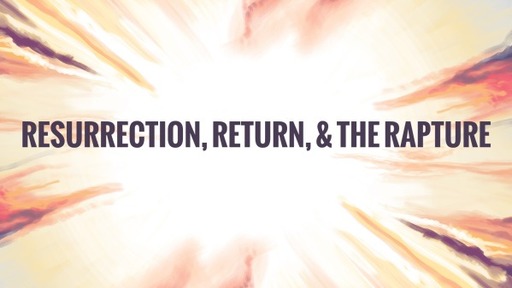Eschatology (2)

Resurrection, Return, & the Rapture
Precursory Thoughts
I. Resurrection of the Dead
A. The Two Kinds of Resurrection:
1. The Resurrection unto Life
B. Who is part of these resurrections?
C. Will these occur simultaneously?
1. The Resurrection unto Life
2. The Resurrection to Damnation (The Second Resurrection)
D. The Stages of the First Resurrection
1. The First Stage is Christ
2. The Second Stage is the Church at the Time of the Rapture
3. The Final Stage is those who are Christians during the Tribulation
II. Return of Christ
Do the words used for the second coming in the New Testament indicate that it will be a single event (posttribulationism), or can they describe two events separated by seven years (pretribulationism)?
Parousia- meaning “coming”, “arrival”, or “presence”.
Two different conclusions are possible from this evidence. (1) Parousia describes the same, single event, meaning that the rapture and the second coming are a single event at the end of the Tribulation. (2) Parousia describes two separate events, both characterized by the presence of the Lord, but events that will not happen at the same time. Either conclusion is valid.
Consider an illustration. Suppose proud grandparents should say to their friends, “We are looking forward to enjoying the presence (parousia) of our grandchildren next week;” then later in the conversation add, “Yes, we expect our grandchildren to be present at our golden wedding celebration.” If you heard those statements you could draw either of two conclusions. (1) The grandchildren are coming next week for the golden wedding anniversary, In other words, the grandparents were speaking of the coming and the anniversary as a single event, occurring at the same time. Or (2) the grandchildren will be making two trips to see their grandparents—one next week (as part of their vacation, say), and another later to help celebrate the golden wedding anniversary.
Likewise, since the Lord’s presence (parousia) will characterize both the rapture and the second coming, the word itself does not indicate whether these are a single event or separate events. In other words, the vocabulary used does not necessarily prove either pre- or posttribulationism.
Apokalupsis- meaning “revelation”
Two conclusions are possible. (1) The rapture and the second coming are the same single event. Since both are called a revelation of Christ, they must occur at the same time and be part of the same event at the end of the Tribulation. (2) Both the rapture and the second coming will reveal Christ, but not at the same time or under the same circumstances. Therefore, the rapture and the second coming can be separated as pretribulationism teaches.
Notice that the first conclusion used the word revelation as a cataloging word; that is, it catalogs whatever event is referred to in all the passages where the word is used as the same, single event. The second conclusion sees the word revelation as a characterizing word; that is, it is used to characterize different events in the same way, as a revelation.
Epiphaneia- meaning “manifestation”
Take the word motor. My automobile has a motor. My wife’s washing machine has a motor. My moped has a motor. Our furnace fan has a motor. My camera has a motor that automatically advances the film. Is the term motor a characterizing feature of these rather diverse machines? Or is it a means of cataloging them that would force us to conclude that everything that has a motor is the same thing? The answer is obvious.
But the posttribulationists’ underlying assumption in continuing to use this argument is that these words catalog rather than characterize. To be sure, vocabulary might do that; but to be equally sure, it might not.
III. Rapture of the Church
What is the Rapture?
The Greek word from which we take this term rapture appears in 1 Thessalonians 4:17 and is translated “caught up.” The Latin translation of this verse uses the word rapturo, from which we derive our English word rapture. So it is a biblical term that has come to us through the Latin translation of 1 Thessalonians 4:17.
The original Greek word in that verse is harpazo. Like the Latin word it also means to snatch or take away, and it occurs thirteen times in the New Testament. It describes how the Spirit caught up Philip near Gaza and brought him to Caesarea (Acts 8:39). Paul used it to describe his experience of being caught up to the third heaven (2 Corinthians 12:2–4). Thus there can be no doubt that it is describing an actual removal of people from earth to heaven when used in 1 Thessalonians 4:17 of the rapture of the church.
